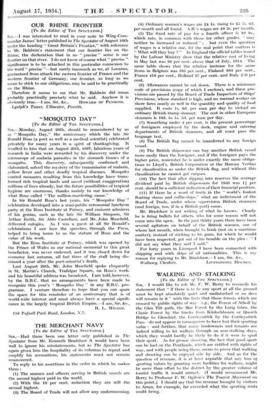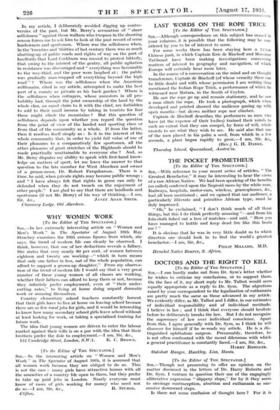WALKING AND STALKING [To the Editor of TIIE SvEcTsTon] Sta.,—I
would like to ask Mr. F. W. Berry to reconcile his statement that "if there is to be any sport at all the ground must be kept absolutely quiet and undisturbed or no deer will remain in it" with the facts that those forests which are crossed by public rights of way e.g., the Forest of Athol' by the Glen Tilt path, the Mar Forest by the Lang Ghru, the Clunie Forest by the tracks from Kinlochhourn or Quoich Bridge to Glenshiel, the Corrieyairiek by the Corrieyairick Pass—do not appear in consequence to have lost their sporting value : and further, that many landowners and tenants are indeed willing to let walkers through on non-stalking days, which they would hardly be likely to do if it were to spoil their sport. As for grouse shooting, the fact that good sport can be had on the Pentlands, which are riddled with rights of way, and with people using them, seems to prove that walking and shooting can be enjoyed side by side. And as for the question of revenue, it is at least arguable that any loss Of sporting values by granting more facilities for walkers, might be more than offset to the district by the greater volume of tourist traffic it would attract. (I would recommend Mr. Berry to Professor F. W. Ogilvie's The Tourist Movement on this point.) I should say that the revenue brought by visitors to Arran, for example, far exceeded -what the sporting rents could bring. In my article, I deliberately avoided digging up contro- versies of the past, but Mr. Berry's accusation of "sheer selfishness" against those walkers who trespass in the shooting season forces me to ask him to look at the past record of some landowners and sportsmen. Where was the selfishness when, in the 'twenties and 'thirties of last century there was so much shutting-up of public roads and rights of way on the part of landlords that Lord Cockburn was moved to protest bitterly, that owing to the interest of the gentry, all public agitation in resistance was discouraged and " everything was favourable to the way-thief, and the poor were laughed at ; the public was gradually man-trapped off everything beyond the high road " ? Where was the selfishness when the American millionaire, cited in my article, attempted to make the best part of a county as private as his back garden ? Where is the selfishness when eottagers, whose ancestors in all pro- bability had, through the joint ownership of the land by the whole clan, an equal claim to it with the chief, are forbidden to add to their small income by taking in tourists for fear these might climb the mountains ? But this question of selfishness depends upon whether you regard the question from the point of view of the landed and sporting class or from that of the community as a whole. If from the latter, then it resolves itself simply as : Is it in the interest of the whole community that, in order to yield full value of one of their pleasures to a comparatively few sportsmen, all the other pleasures of great stretches of the Highlands should be made practically unattainable to everyone else ? And, as Mr. Berry disputes my ability to speak with first-hand know- ledge on matters of sport, let me leave the answer to that question to the late member for West Aberdeen and owner of a grouse-moor, Dr. Robert Farquharson. There is a time, lie said, when private rights may become public wrongs ; and "I have always felt that rights in game can only be defended when they do not trench on the enjoyment of other people." I am glad to say that there are landlords and sportsmen (if not Mr. Berry) of his way of thinking.—! am, Sir, &c., JANET ADAM SMITH. C'hanonry Lodge, Old Aberdeen.



































 Previous page
Previous page